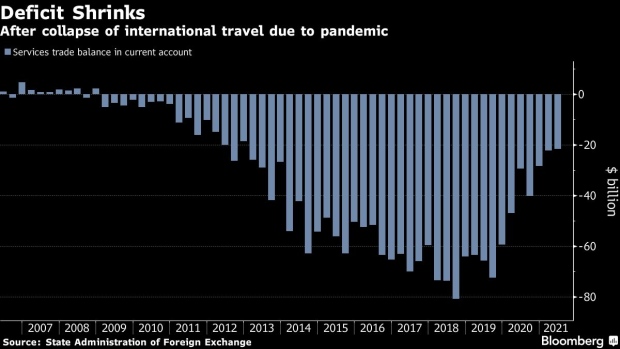Sep 1, 2021
China’s Xi To Talk On Services Trade as U.S. Tensions Simmer
, Bloomberg News

(Bloomberg) -- China’s President Xi Jinping will address a services trade summit in Beijing Thursday as the country tries to expand trade in intangible products such as software, tourism or education, where it had a large deficit prior to the pandemic.
Investors will be watching the comments closely for any hints on regulatory moves following a broad campaign recently to rein in internet platform and education companies, which have rocked financial markets in recent months.
In the past Xi has used similar government-organized events as a way to publicize China’s gradual opening to foreign investment in service sectors such as finance and healthcare, where Beijing sees the introduction of foreign competition as a key part of modernizing its economy.
He has also used such events as a platform to criticize U.S. trade policy, positioning China as a supporter of globalization during the presidency of trade-sceptic Donald Trump. His successor Joe Biden has so far ignored Beijing’s calls to withdraw tariffs the previous U.S. administration imposed on Chinese goods exports.
International tourism, which has plunged globally due to the pandemic, is a major component of trade in services. China’s imports and exports of services dropped 15.7% year-on-year to 4.6 trillion yuan ($712 billion) in 2020 mainly due to the sharp decline in tourism, according to official figures.
Because Chinese tourists spent much more abroad than overseas tourists spend within China, the country has run a persistent deficit in services trade, exceeding 1.5 trillion yuan in 2019. That deficit has narrowed in recent years due to rapid growth in service exports, in part due to the overseas success of technology companies such as TikTok owner Bytedance Ltd.
China tightly restricts access to foreign companies in some sectors such as digital services, effectively banning overseas social networking platforms such as Facebook from serving consumers in the country. The country has more restrictive policies on services trade than the average seen in the Organisation for Economic Cooperation and Development, according to an index compiled by the club of mostly wealthy economies. However, China has strategically opened some sectors in recent years and its services trade restrictiveness has seen one of the largest declines of any country since 2014, according to the OECD.
©2021 Bloomberg L.P.







